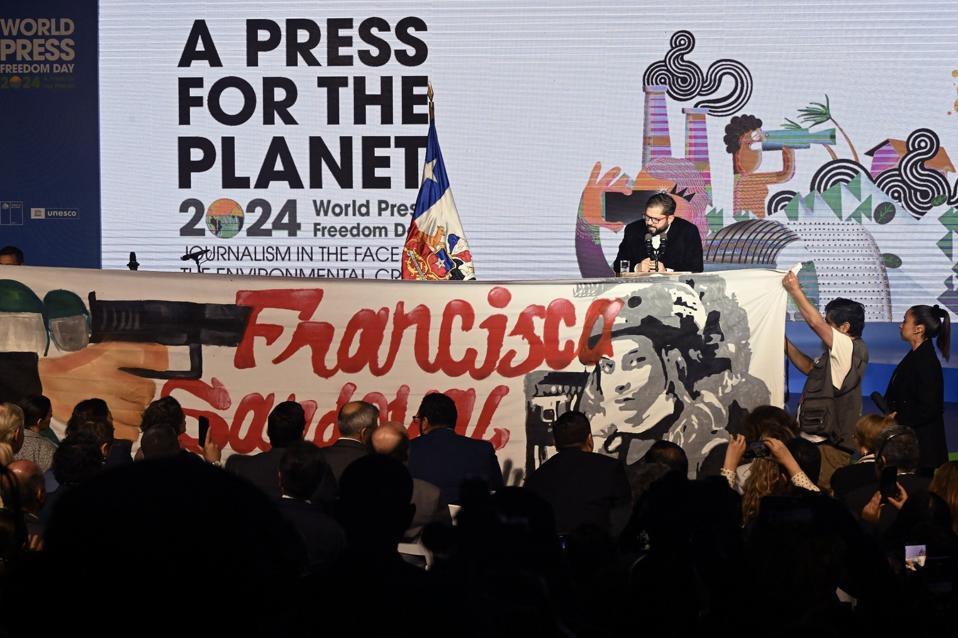May 3 marks World Press Freedom Day, a day designated by the United Nations to galvanize action to ensure and protect press freedom globally. It gives the opportunity to assess the state of press freedom throughout the world, defend the media from attacks on their independence, and pay tribute to journalists who have lost their lives in the line of duty, among others. In 2024, World Press Freedom Day is dedicated to the importance of journalism and freedom of expression in the context of the current global environmental crisis.
As reported by the U.N., “journalists encounter significant challenges in seeking and disseminating information on contemporary issues, such as supply-chains problems, climate migration, extractive industries, illegal mining, pollution, poaching, animal trafficking, deforestation, or climate change. Ensuring the visibility of these issues is crucial for promoting peace and democratic values worldwide.” Dis- and misinformation about environmental issues can lead to a lack of public and political support for climate action, effective policies, and the protection of vulnerable communities affected by climate change, as well as of women and girls, as climate change tends to exacerbate existing inequalities.
Reporting on environmental issues comes with high risks which go far beyond challenging the science covered by them. As reported by UNESCO, 70% of environmental journalists from 129 countries, polled in March 2024, reported experiencing attacks, threats or pressure related to their job. Of those, two in five subsequently experienced physical violence. As the UNESCO report states, at least 749 journalists and news media outlets reporting on environmental issues were targeted with murder, physical violence, detention and arrest, online harassment or legal attacks in the period 2009-2023. More than 300 attacks occurred between 2019-2023 – a 42% increase on the preceding five-year period (2014-2018). The problem is global, with attacks taking place in 89 countries in all regions of the world. UNESCO’s Observatory of Killed Journalists records the killing of at least 44 journalists investigating environmental issues over the last 15 years, of which only five have resulted in convictions – a shocking impunity rate of almost 90%.
In order to protect press freedom, the U.N. proposes a comprehensive strategy to include the need to prevent and protect against crimes committed against journalists, ensure the rights to freedom of expression, freedom of scientific research, and access to key sources of information, in addition to combating dis-/misinformation through journalism, and promote the plurality, diversity, and viability of media, especially regional, local, indigenous, and/or community-based media, among others.
These recommendations are key to press freedom, whether for environmental journalists or journalists more broadly. Journalists continue to be killed globally, and very little is being done to ensure their safety. As reported by Reporters Without Borders, in 2023, at least 50 journalists were killed when performing their job. According to their data, the deadliest place for journalists in 2023 was in the Palestinian territories, where 16 deaths were counted in just the last three months of the year. The top of the list was then followed by Mexico with four deaths reported there in 2023, three in Afghanistan, three in Bangladesh, three in Lebanon, and two deaths in Cameroon, Ukraine and the Philippines, respectively.
UNESCO identified at least 65 journalists who have been killed in the line of duty in 2023. While according to UNESCO, the overall number of deaths may have been on the decrease, the number of killings in conflict zones has increased. As UNESCO stressed, “at least 38 journalists and media workers were killed in the line of work in countries in conflict in 2023, compared to 28 in 2022 and 20 in 2021. The ongoing hostilities in the Middle East were responsible for a large majority of conflict-related killings, with UNESCO having so far reported 19 killings in Palestine, 3 in Lebanon and 2 in Israel since 7 October. Afghanistan, Cameroon, Syria and Ukraine also each saw at least two killings.”
As UNESCO indicates, such attacks contribute to what it refers to as “zones of silence” opening up in many conflict zones. This has severe consequences for access to information, both for local populations and the world at large. In the words of U.N. Secretary-General António Guterres, “Without freedom of the press, there are no real democratic societies. Without freedom of the press, there is no freedom.”

